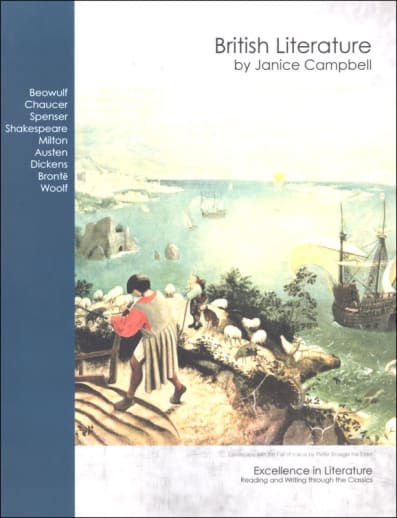This series lives up to its name: Excellence in Literature. Designed to both teach students to read with discernment and to train them to be independent, self-motivated learners, they will likewise be introduced to great literature from the Western tradition and provided with tools to strengthen their writing skills. In other words, they will be well-prepared for college classes. Updating to a Fourth edition (2021), each updated manual provides more content on essay-writing, augmented model essays, and an expanded section on evaluating writing.
Each course is a non-consumable manual with outlines for nine units of study each with four weeks of assignments. Students read and respond to great literature - great because the selections reveal truth through the power of story. And although each unit has a focus text, additional reading is also expected - contemporary poetry, essays, biographical sketches, etc. Also provided are suggestions for additional reading and writing assignments for those wanting to count the course as an Honors English course. Assignments follow a typical path but they have been carefully chosen so that knowledge and skills build sequentially although a competency level of literary analysis and writing skills are assumed. If the student is unsure about these, he should consider two resources as prerequisites (or do them concurrently) - Teaching the Classics and Elegant Essay. Although the student is expected to do his own contextual research (information about author and story background), directed paths are provided in the form of quality web links and research suggestions - and these are extensive (audio, video, visual arts, music, historic/geographic context, places to go, and relevant quotes).
During the completion of each four-week unit, students will complete a number of written assignments including author profiles, approach papers, historical papers, and 750 -word essays usually from a choice of topics. Not to worry, though. A Formats and Models section provides exactly what it sounds like - formats for the various types of papers accompanied by sample (model) writing papers prepared in accordance to the suggested format. Very helpful! Also helpful is the How to Evaluate Writing section and its Evaluation Rubric. The author's Handbook for Writers serves well as a writer's resource and is recommended.
The courses are designed for the student to work through independently. Assignments contain specific instructions. So what does that leave for the teacher/parent to do? Become a Writing Mentor, of course. Plan to spend some time each week with the student talking through assignments, literary gleanings, and preparation. The Mentor should also be prepared to either evaluate the papers - or find someone else to do so. Oh, and by the way, students will be compiling a binder-notebook-portfolio.
Although it may be hard to believe that the author, Janice Campbell, has packed so much into such a tidy package, it's true. Introductory information includes a course overview, FAQs, and short sections on How to Read a Book and Discerning Worldview through Literary Periods. At the back of the book is not only the amazing Formats & Model section, but also a helpful section on Honors preparation, and a glossary. The detailed unit lesson plans make up the rest of the course.
The author suggests the following scope and sequence: Introduction to Literature, Literature and Composition, American Literature, British Literature, and World Literature, but a student with appropriate literary course experience could "jump in" at any point to do one or more of the courses. These are excellent college-prep courses that allow the student to work independently, take a whole-book approach with a suitable emphasis on essay responses to literature, and can be easily "upgraded" to an Honors level. ~ Janice

